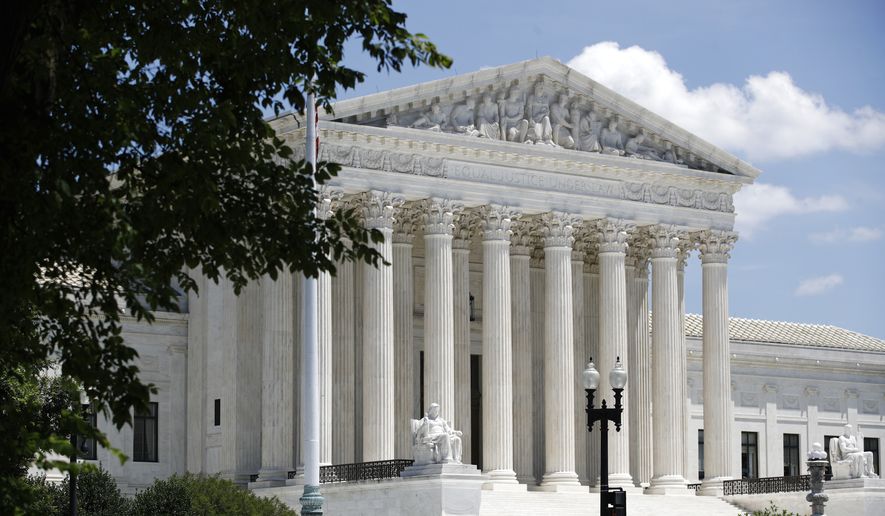A unanimous Supreme Court delivered a win Monday for a Christian group wanting to fly its flag outside Boston’s City Hall, ruling that the city’s policy unfairly discriminated against religious groups’ First Amendment rights.
The justices said Boston had denied the group its chance to fly a flag because the city feared it would violate the Constitution’s Establishment Clause, which bars the state from endorsing or instituting a religion.
But the city bungled its interpretation of the constitutional prohibition and ended up treating the religious group worse than anyone else — an impermissible violation of the group’s free speech rights, the court ruled.
“Under the Constitution, a government may not treat religious persons, religious organizations, or religious speech as second-class,” Justice Brett M. Kavanaugh said in his concurring opinion.
Boston had argued the flagpole — one of three outside City Hall — was effectively a part of the city’s messaging, and so it should be able to control what flags flew there.
The problem, the justices said, is that the city had allowed every other requesting group to fly a flag until Camp Constitution, a Christian organization, asked to fly its Latin Cross banner on Constitution Day in 2017.
The court said the city’s previous action, allowing nearly 300 other flag-flyings since 2005, had effectively made the flagpole a public forum, similar to a town square or sidewalk. Denying one voice while allowing others violated the First Amendment’s free speech guarantee.
“The boundary between government speech and private expression can blur when, as here, a government invites the people to participate in a program,” retiring Justice Stephen G. Breyer wrote in the court’s unanimous opinion.
“This case is so much more significant than a flag,” said Mat Staver, founder of Liberty Counsel, which defended Camp Constitution. “Government cannot censor religious viewpoints under the guise of government speech.”
Rachel Laser, president of Americans United for Separation of Church and State, said the case doesn’t change the big dividing lines on government and religion, but said she worries “the dominant religious majority” would abuse it.
“This decision is a reminder that groups representing religious minorities and nontheists must be given equal access to these kinds of public forums to display their own symbols,” Ms. Laser said.
She also complained about Camp Constitution, the group that challenged Boston, and its goal of teaching that America “was founded as a Christian nation.”
“That is Christian nationalism, which is a direct threat to church-state separation and our democracy,” she said.
During oral argument on the case, Boston’s lawyer had said if the city lost, it would probably rewrite its flag policy to exert more control over the flagpole, making clear it was part of the city’s voice rather than a public forum.
Monday’s ruling would allow that.
The case is Shurtleff v. City of Boston. Hal Shurtleff is director and co-founder of Camp Constitution.
The flag Mr. Shurtleff asked to fly is white with a red cross on a blue square in the upper left-hand corner. Boston had acknowledged that the flag itself wasn’t objectionable, but the connection to a faith-based group made it problematic.
The Biden administration had sided with Mr. Shurtleff in the case, saying Boston had turned its flagpole into “an open mic night,” until a Christian group asked to use the microphone.
Lower courts ruled against Mr. Shurtleff, making Monday’s 9-0 decision all the more striking.
The dissonance suggests judges are still struggling with how to strike the right balance between the Constitution’s dual stricture against religious entanglement and its guarantee of religious freedom.
Justice Neil M. Gorsuch, in a concurring opinion, said that’s because of a 1971 case, Lemon v. Kurtzman, in which the high court laid out a complicated test for figuring out if the government had become too entangled with religion.
Justice Gorsuch said the court hasn’t applied Lemon for two decades, but litigants — including Boston — continue to try to use it to shield themselves from scrutiny when they act against a religious interest.
“It proved a costly decision, and Boston’s travails supply a cautionary tale for other localities and lower courts,” the justice wrote.
• Stephen Dinan can be reached at sdinan@washingtontimes.com.
• Alex Swoyer can be reached at aswoyer@washingtontimes.com.




Please read our comment policy before commenting.